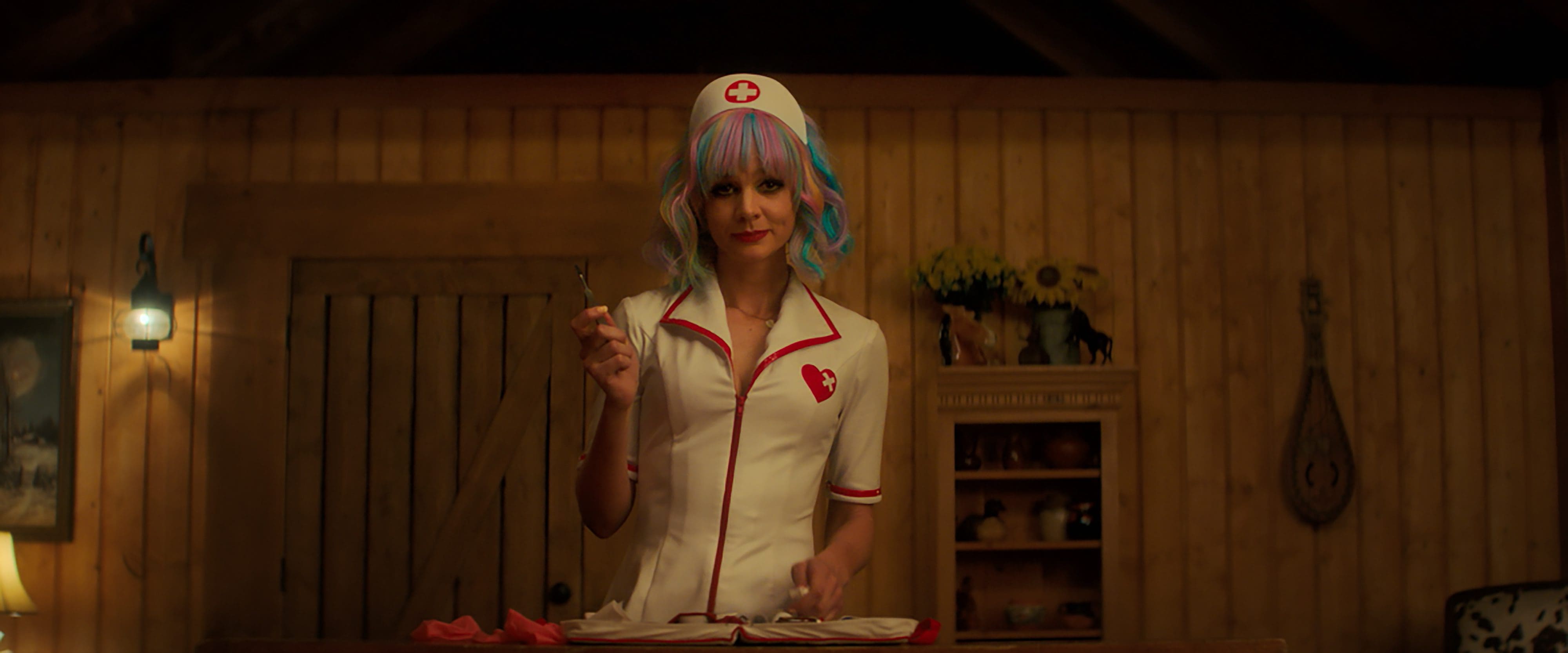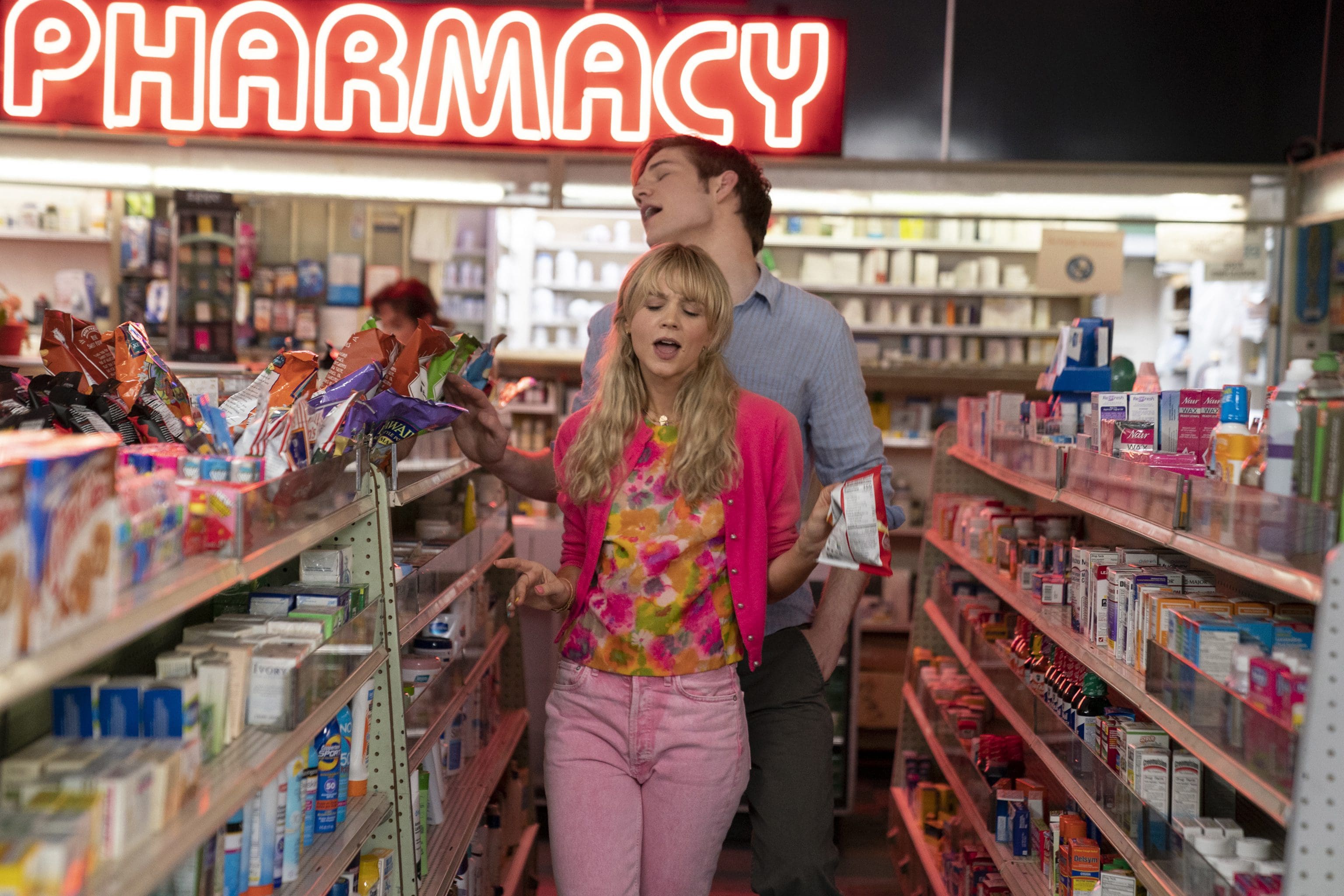
A year ago, back when life was different and we could still see movies in theaters, few trailers could draw out a reaction like Promising Young Woman’s. With every dry, misandrist line of writer-director Emerald Fennell’s dialogue, you could practically hear the electric thrill of excitement run through the women in the audience—and, just as often, audible discomfort from the men. Unfortunately, thanks to COVID-19, most of us won’t get to experience those same reactions at feature length in a theater. And while Promising Young Woman is still provocative enough to surprise viewers streaming it at home, it does feel like the kind of thriller that works best experienced with a crowd.
Though the prospect of watching Carey Mulligan’s Cassie work out her rage over her friend Nina’s assault years earlier by pretending to be drunk in bars so she can scare men by revealing she’s sober when they try to take advantage of her is certainly the film’s biggest draw, as with that first trailer–with its electrifying violin cover of Britney Spears’s “Toxic”–Promising Young Woman’s most immediate and distinct pleasure is its soundtrack. The film’s opening scenes, in which an “inebriated” Cassie goes home with Jerry (Adam Brody), the seemingly wokest guy in a group of sexist male businessmen, play out largely as they do in the trailer. The encounter ends on the same note as it does there: with Jerry recoiling in fear as Cassie drops her act.
Rather than show us what happens directly after, however, Fennell gives the audience one of the film’s many great needle drops, a cover of The Weather Girls’ “It’s Raining Men” by DeathbyRomy that plays as Cassie does a walk of shame from Jerry’s home, a red liquid running down her arm that looks like blood but could just be runaway jelly from the donut she’s eating. It’s a tantalizing image, but Fennell fairly quickly disabuses the viewer of the idea that Cassie may be killing or maiming the men she picks up. As we learn during her encounter with Christopher Mintz-Plasse’s Neil (also partially featured in the trailer), Cassie simply shocks and threatens each man, leaving them emotionally and psychologically scarred if not literally.
Considering how violent Villanelle is on Killing Eve (for which Fennell was the second season’s showrunner) it’s both a bit surprising and a little disappointing that Cassie doesn’t go further. Moreover, without overt violence, it’s worth questioning what her vendetta achieves at all. Given the way one of Jerry’s friend’s dismisses Cassie as “that psychopath” when he recognizes her later, it’s not even clear if her victims learn a lasting lesson. Really, the only concrete consequence of Cassie’s vendetta is her annihilation of anything about herself except her hatred for men. She is friendless, hates her job at a coffee shop, didn’t finish medical school because of what happened to Nina and has no goals in life other than scaring men on the weekends. Fun as it is to watch Cassie menace a few douchebags, the film would quickly become repetitive and a little depressing if that’s all she did, so, Fennell eventually focuses Cassie’s rage on a list of people who helped the man who assaulted Nina escape punishment.
Rather fascinatingly, that list is made up largely of women and, whether deliberately or coincidentally, it’s with them that Cassie is her most cruel. One of them is Dean Walker (Connie Britton), the college administrator who both investigated and dismissed Nina’s initial accusations. The revenge begins with Cassie kidnapping Walker’s airhead teenaged daughter (whose outfit is rather curiously made of a plaid yellow fabric almost identical to one worn by Cher Horowitz in Clueless). Mulligan has many brilliant moments throughout the film, but she does exquisite work in making sure the audience can still recognize Cassie’s sinister intelligence simmering beneath her ruse that she’s a make-up artists for the girl’s favorite band on the way to their latest video shoot. She’s even better in the scene that follows, as Cassie pretends she wants to come back to school to finish her degree only to end up harshly questioning Walker’s actions in handling Nina’s case. Watching her calmly chew gum and smirk as Walker grows hysterical at hearing the details of the kidnapping is one of the film’s most darkly funny moments.
Still, amusing as that scene can be, it does highlight a major issue in the film’s logic. While Cassie may reveal that she’s greatly exaggerated the kidnapping at scene’s end, it does seem impossible that this woman wouldn’t call the police the second Cassie left the room. Indeed, nearly everything Cassie does she achieves without consequence. The men she meets in bars always back down under her questioning rather than turn violent and it’s, frankly, a little hard to believe. However, these moment of revenge aren’t meant to feel completely real. Rather, they’re satisfying but safe comeuppance an audience steeped in a post-#MeToo discourse can understand and enjoy. Instead, their main function within the film is more to push Cassie’s character forward than explore ideas of patriarchy and misogyny in new ways.

Indeed, after realizing that getting Walker to admit she handled Nina’s accusations incorrectly doesn’t erase Cassie’s rage but amplifies it, Fennell uses that incident to shift the narrative thrust to Cassie budding romance with Ryan (Bo Burnham), who went to medical school with her. Though Mulligan and Burnham share palpable chemistry and stimulating banter, it’s initially a little difficult to discern why Cassie would be drawn to Ryan after years of refusing to date or get close to nearly anyone, it eventually becomes clear that it’s because he’s the only man she meets who not only isn’t afraid of her dry, somewhat threatening humor, but appreciates it. When he jokes that she can spit in his coffee after he says something awkward the first time they reconnect, she does it in hope of scaring him off, but he calls her bluff, looking into her eyes as he drinks the coffee anyway.
It’s a twisted but fun meet-cute and the rom-com beats that follow are not only a big part of what makes Promising Young Woman so enjoyable, but what tricks the audience into thinking for awhile that maybe the revenge plot is just a means of getting a woman to overcome trauma and learn to love again. While a scene where Cassie invites Ryan to have dinner with her parents is quietly crushing in the way it reveals just how much Cassie’s trauma has affected those around her, Cassie and Ryan’s best moment is a love montage that begins in a pharmacy. In by far the film’s most inspired use of music, Paris Hilton’s “Stars are Blind” begins to play on the store’s speakers and Cassie makes fun of Ryan as he sings the lyrics. However, Cassie soon joins in, dancing through the aisles and singing along too while scenes of them falling in love interject.
If Promising Young Woman just turned out to be a rom-com with a dark sense of humor, it would probably be satisfying if unremarkable — maybe a little disappointing for not delivering on its furious premise. It would be unforgivable to spoil the twist the film takes in its final act, but that turn does make it clear that Fennell’s subject was misogyny and revenge all along and that the romantic comedy aspect was not just a misdirect, but part of that discussion. Certainly, Fennell deserves praise for taking the film in the direction she does. It’s a bold choice that will shock pretty much every viewer, the question is whether it ultimately leads to a satisfying ending for the characters and metaphors she sets up.
Each viewer’s answer to that question is what will make this film so divisive. For those who find Fennell’s final choices daring and gratifying, likely just as many will find them frustrating, playing into the very tropes the film seemed to subvert and ultimately placing too much faith in institutions we know work against women’s interests. However, for those left wanting more from the film, perhaps it’s worth wondering if they’d feel that way at all if they got to experience those final wild twists in a theater. From the trailer to the finished product, it is so clear that Promising Young Woman is supposed to be a crowd-pleasing genre thriller best served by being experienced while eating popcorn in a dark room full of strangers ready to have fun and be shocked. What a horrible waste of brilliance if seeing it at home on a tiny screen with no more than a handful of people saps it of its power.

